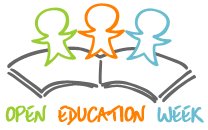An Open Course on Open Educational Resources
OER-101 is an open, self-paced online community course that has been
built to demonstrate how to find, adapt, and develop OERs step-by-step. These OERs may then be licensed via Creative Commons, printed and bound, and integrated into any type of learning environment.
The goals of OER-101 include: defining OERs, demonstrating how to create and interact with them, and exploring how to include them in the teaching and learning processes. The course materials have been designed and chosen with practicality, simplicity, and applicability in mind.
I like that the participants in the course are strongly encouraged to submit the OERs they develop to an OER repository under a Creative Commons license.
The course is organized into five “pursuits,” each of which represents one facet of the world of OERs. Participants are encouraged to complete all of the pursuits by following the suggested course progression, but each pursuit can also be completed individually.
The course will be offered through Blackboard’s CourseSites and participants may self-enroll in the course by creating a free account from https://opensuny.coursesites.com. Use the LOGIN button at the top of the page. The course opened January 16, but materials are due to be available on the 23rd.
The providers are also exploring the possibilities of offering badges in open courses. For evaluation and feedback, OER-101 will employ a badging system powered by Mozilla Open Badges. The badging experiment is funded by a SUNY Innovative Instruction Technology Grant. Participants will earn badges by completing the course pursuits and will receive a "master badge" for course completion.
The course will utilize a community learning model informed by a facilitation method established by Philyse Banner at the American Public University System.
The results from this course will be documented within the SUNY Learning Commons.
Here's a fun (and open) "trailer" for the course.
 Open Education Week is March 11-15, 2013.
Open Education Week is March 11-15, 2013. 